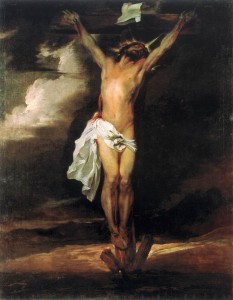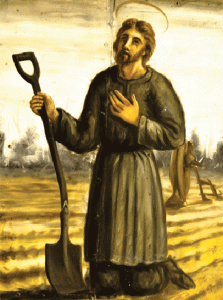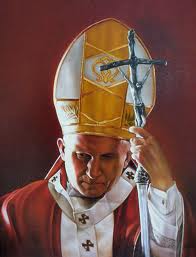From the
Twentieth Hour – “Father forgive them…”
 My Crucified Good, I see You on the Cross, as on the Throne of your triumph, in the act of conquering everything and all hearts, and of drawing them so closely to You, that all may feel your superhuman power. Horrified at such a great crime, nature prostrates itself before You, and waits in silence for a word from You, to pay You honor and let your dominion be recognized.
My Crucified Good, I see You on the Cross, as on the Throne of your triumph, in the act of conquering everything and all hearts, and of drawing them so closely to You, that all may feel your superhuman power. Horrified at such a great crime, nature prostrates itself before You, and waits in silence for a word from You, to pay You honor and let your dominion be recognized.
The sun, crying, withdraws its light, unable to sustain your sight, too sorrowful. Hell is terrified and waits in silence. Everything is silence. Your pierced Mama, your faithful ones, are all mute; and petrified at the sight of your torn and dislocated Humanity – alas, too painful, they are silently waiting for a word from You. Your very Humanity is silent, lying in a sea of pains, among the harrowing spasms of agony; so much so that they fear You are going to die at each breath!
What more? Even the perfidious Jews and the ruthless executioners who, up to a little while ago, were offending You, mocking You, calling You impostor, criminal; even the thieves who were cursing You – everyone is silent, mute. Remorse invades them, and if they try to launch an insult against You, it dies on their lips.
But as I penetrate into your interior, I see that love overflows; it suffocates You and You cannot contain it. And forced by your love that torments You more than the pains themselves, with strong and moving voice, You speak as the God You are; You raise your dying eyes to Heaven, and exclaim: “Father, forgive them, for they know not what they are doing!” And, again, You close Yourself in silence, immersed in unheard-of pains.
Crucified Jesus, how can so much love be possible? Ah, after so many pains and insults, your first word is of forgiveness; and You excuse us before the Father for so many sins! Ah, You make this word descend into each heart after sin, and You are the first to offer forgiveness. But how many reject it and do not accept it; your love is then taken by follies, because You anxiously desire to give your forgiveness and the kiss of peace to all!
At this word, hell trembles and recognizes You as God; nature and everyone remain astonished; they recognize your Divinity, your inextinguishable love, and silently wait to see where it reaches. And not only your voice, but also your Blood and your wounds, cry out to every heart after sin: “Come into my arms, for I forgive you, and the seal of forgiveness is the price of my Blood.” O my lovable Jesus, repeat this word again to all the sinners which are in the world. Beseech mercy for all; apply the infinite merits of your most precious Blood for all. O good Jesus, continue to placate Divine Justice for all, and concede your grace to those who, finding themselves in the act of having to forgive, do not feel the strength to do it.
My Jesus, adored Crucified, in these three hours of most bitter agony, You want to give fulfillment to everything; and while, silent, You remain on this Cross, I see that in your interior You want to satisfy the Father in everything. You thank Him for all, You satisfy Him for all, You beseech forgiveness for all, and for all You impetrate the grace that they may never again offend You. In order to impetrate this from the Father You go through all of your life, from the first instant of your conception, up to your last breath. My Jesus, endless love, let me go through all your life together with You, with the inconsolable Mama, with Saint John, and with the pious women.
FORGIVE EVERYONE
In Dostoevsky’s great last work, The Brothers Karamazov, the story is told of Markel, brother of the Elder Zossima. Diagnosed with tuberculosis, he is dying. In those last days he came to a renewed faith in God and a truly profound understanding of forgiveness. In a conversation with his mother she wonders how he can possibly be so joyful in so serious a stage of his illness. His response is illustrative of the heart of the Orthodox Christian life.
’Mama,’ he replied to her, ‘do not weep, life is paradise, and we are all in paradise, but we don’t want to realize it, and if we did care to realize it, paradise would be established in all the world tomorrow.’ And we all wondered at his words, so strangely and so resolutely did he say this; we felt tender emotion and we wept….’Dear mother, droplet of my blood,’ he said (at that time he had begun to use endearments of this kind, unexpected ones), ‘beloved droplet of my blood, joyful one, you must learn that of a truth each of us is guilty before all for everyone and everything. I do not know how to explain this to you, but I feel that it is so, to the point of torment. And how could we have lived all this time being angry with one another and knowing nothing of this?’ [He spoke even of being guilty before the birds and all creation] …’Yes, he said, ‘all around me there has been such divine glory: birds, trees, meadows, sky, and I alone have lived in disgrace, I alone have dishonored it all, completely ignoring its beauty and glory.’ ‘You take too many sins upon yourself,’ dear mother would say, weeping. ‘But dear mother, joy of my life. I am crying from joy, and not from grief; why, I myself want to be guilty before them, only I cannot explain it to you, for I do not know how to love them. Let me be culpable before all, and then all will forgive me, and that will be paradise. Am I not in paradise now?’
As difficult as it may sound, the reality described by Dostoevsky can be summed up very simply: forgive everyone for everything. Stated in such a blunt fashion, such a goal is overwhelming. How can I forgive everyone for everything? This life of forgiveness, which is nothing other than the life of Christ within us, is our inheritance in the faith. The life of blame, recrimination, bitterness, anger, revenge and the like are not the life of Christ, but simply the ragings of our own egos, the false self which we exalt over our true life which is “hid with Christ in God.”
The rightness of a cause, or the correctness of our judgment do not justify nor change the nature of our ragings. For none of us can stand before God and be justified – except as we give ourselves to the life of Christ, who is our only righteousness.
The question of forgiveness is not a moral issue. We do not forgive because it is the “correct” thing to do. We forgive because it is the true nature of the life in Christ. As Dostoevsky describes it: it is Paradise. In the same manner, the refusal to forgive, the continuation of blame, recrimination, bitterness, etc., are not moral failings. They are existential crises – drawing us away from the life of Christ and Paradise, and ever deeper into an abyss of non-being.


























